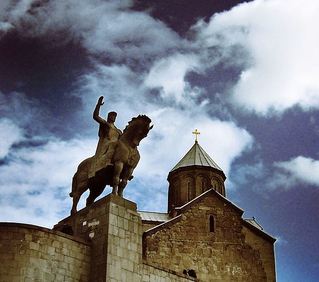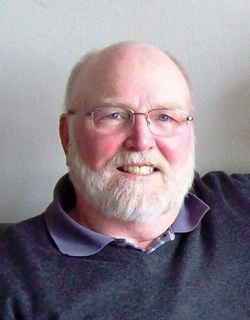
The sky has started to lighten in the east as I step out on my balcony at Betsy's Hotel on the mountainside overlooking Tbilisi, the ancient capital. Street lights twinkle across an otherwise dark city. The air is fresh and cool, but the day promises to be clear and warm. The neighborhood is quiet as most residents have not yet begun to stir. Even the dogs are silent. The dominant sounds of this pre-dawn hour are the gentle cooing of pigeons and the crowing of an urban backyard rooster. There is only occasional traffic on an at-any-other-time bustling Rustaveli Avenue far below me in the city center. I should be sleeping as well, but I have not yet fully adjusted to the time and place to which I have come.
There can be no coffee until the hotel restaurant opens for breakfast at 7:00, so I dress and head out the door for a long morning walk. Beyond my hotel on the same street is the grey Russian Orthodox cathedral with its illuminated ornate domes and spires. Passing, I turn and descend a pedestrian stairway into the narrow winding streets and alleys that lead down to the heart of the old city. It is still quiet when I reach Rustaveli. The street sweepers are out now with their quaint brooms--mostly elderly women in long black dresses, the uniform of widows, but all wearing official blaze-orange street worker vests. Beyond the Opera House, I consider popping into the historic Tbilisi Marriot for coffee. The lighted windows of the coffee shop beckon--but I decide to continue on as I know it would be unreasonably expensive. Perhaps the kiosk will be opening at Pushkin Park on Freedom Square.
I pass the honey-colored limestone Parliament building where a young Mikhiel Saakashvili and his followers faced down the troops during the "Rose Revolution". A single military policeman parades on the broad steps. I come to the end of Rustaveli Avenue and Pushkin Park. During Soviet times, Freedom Square was dominated by a larger-than-life statue of Lenin standing on a cold granite pedestal. Now the central island of the traffic round-about features a tall gold capped Doric column, lifting up St. George mounted on his steed, as he slays the dragon under hoof. The kiosk at Pushkin Park is still shuttered. I continue to descend a gently curving boulevard towards the river, past the now-excavated foundations of the ancient city walls, past the puppet theatre with its comical clock tower, to the walled terrace that backs Sioni Cathedral. A bearded Georgian Orthodox priest is performing his walking-meditation slowly circling the church as his wife dutifully follows several steps behind. At Metehki Bridge, I stop and gaze across the river at the drum-towered church on its vertical bluff above the water. On the precipice of the bluff stands the equestrian statue of King Vakhtang, medieval founder of Tbilisi, one hand raised as if in greeting.
By now the sun has risen. The city is waking. Traffic is picking up. My mind has cleared. I have fully arrived. I hail an approaching taxi: "First time to Tbilisi?" asks my driver searching for words in English. "No-- I have been many times before." I respond. “It is good to be back.” Up and up the cab climbs the winding cobbled streets taking me back to Betsy's where I will find coffee, colleagues, and the reason for my coming.


 RSS Feed
RSS Feed
